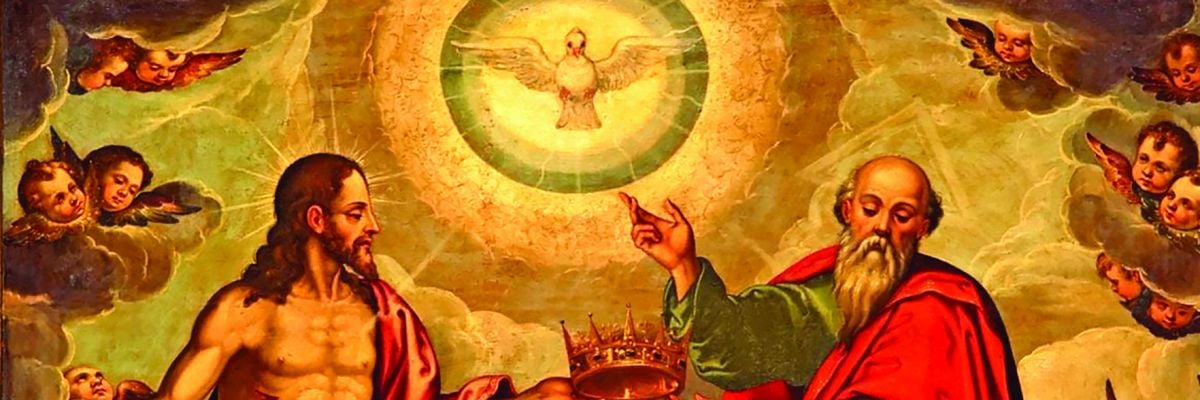
The schism between the Catholic and the Orthodox churches is one of the greatest tragedies in Christian history. It has lasted for almost a millennium with no end in sight. Many complicated factors contributed to this split, but in some ways the division can be traced to one Latin word: filioque.
In order to understand the filioque controversy, we have to go back to the early fourth century. A priest named Arius argued that Jesus wasn’t equal to God the Father and that he was instead a creation. This belief came to be called Arianism. In response, the Church held the Council of Nicea in A.D. 325, which produced a creed proclaiming the divinity of Jesus. The Nicene Creed was focused on Christological issues, and its only mention of the Holy Spirit was simply, “We believe in the Holy Spirit.”
However, soon the divinity of the Holy Spirit was also called into question, and so the Council of Constantinople in 381 expanded the section on the Holy Spirit:
We believe in the Holy Spirit,
the Lord, the giver of life,
who proceeds from the Father.
With the Father and the Son he is worshipped and glorified.
He has spoken through the prophets.
A careful Catholic reader will notice something missing: this Creed says, “who proceeds from the Father” instead of the familiar “who proceeds from the Father and the Son.” The Latin for “and the Son” is filioque. So why was the word filioque added? And why did it cause such a controversy?
Though the battle against Arianism was a long one, and the heresy was largely defeated in the Roman Empire by the end of the fourth century, barbarian tribes embraced Arianism for many years afterward. In the fifth century, Christians in what is now Spain added the word filioque to the Creed to make even more clear the divinity of Christ. Over time the term was adopted by other Christians in the West, which was becoming politically and socially divided from the East.
Christians in the East no longer worried about Arianism, and so the addition “and the Son” was unnecessary for them; some even considered it heretical. They disputed the addition of the filioque to the Creed, and the theological debate divided the two sides. Both East and West used Scripture to support their positions. The East quoted from the Gospel of John:
When the Counselor comes, whom I shall send to you from the Father, even the Spirit of truth, who proceeds from the Father, he will bear witness to me (John 15:26, emphasis added).
In response, the West quoted from the next chapter of John:
Nevertheless, I tell you the truth: it is to your advantage that I go away, for if I do not go away, the Counselor will not come to you; but if I go, I will send him to you (John 16:7, emphasis added).
Although some in the East accepted the orthodoxy of a similar phrase, “through the Son,” they believed that “and the Son” diminished the distinction between the Father and the Son and so must be rejected.
But the greater problem the East had with the phrase was how it was added to the Creed. They believed that a Creed promulgated by an ecumenical council could be altered only by another council. However, the entire West had added the filioque to the creed without the endorsement of an ecumenical council. In the eleventh century, the Church of Rome added it, giving the filioque papal authority and making it definitive.
Most Christians in the East did not accept that the pope had authority over a council. Thus, they thought adding the term without the approval of an ecumenical council was an egregious violation of Church authority. The filioque came to be the flashpoint in the conflicting theological and ecclesiological views of the two churches.
In recent years there has been much work to reunite the East and West, and the subject of the filioque has been broached often. On the Catholic side, there is acceptance of the legitimacy of the Eastern tradition. In fact, Eastern Catholic churches, which are in union with Rome but maintain the traditions of the East, usually do not include the filioque in their liturgical recitation of the Creed. The Catholic Church sees the two traditions as complementary articulations in different words that emphasize different elements of the same mystery (cf. CCC 248).
Sadly, the Orthodox churches still insist that the filioque be dropped from the creed as a condition of reunion. Although some in the East accept the theological legitimacy of the term, none accept the authority of the pope to alter a creed produced by an ecumenical council. And so, the filioque remains a critical aspect of the continuing division between East and West.



